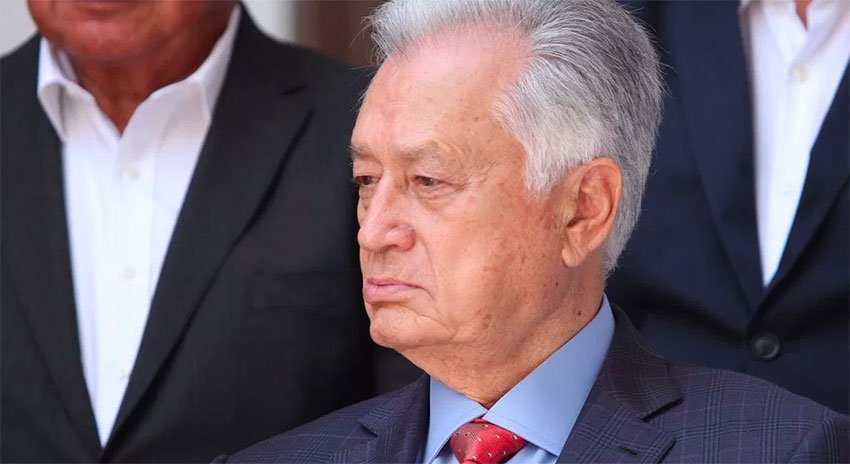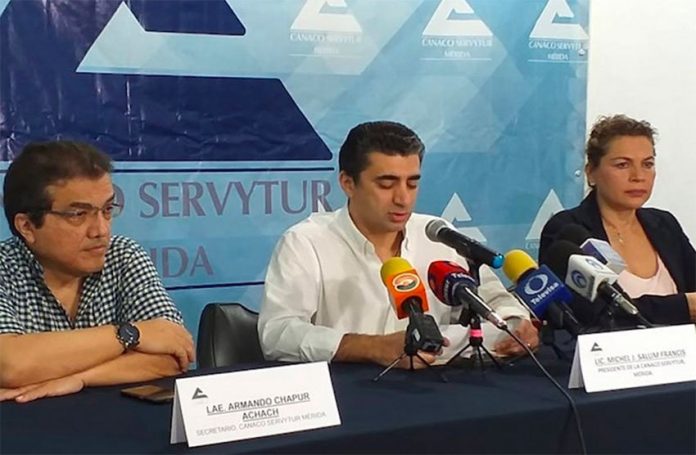There is anger and concern about power outages and natural gas shortages on the Yucatán peninsula even as energy authorities reject the claim that future electricity supply is threatened.
Michel Salum Francis, president of the Mérida chapter of the Mexican Chamber of Commerce, told a press conference yesterday that outages have a severe impact on business, especially the hotel sector, and could even cost lives.
There have already been three widespread blackouts on the Yucatán peninsula this year and yet another outage left the west side of Mérida in the dark on Monday night.
Energy experts have blamed the power cuts on a lack of natural gas to generate power, and the National Energy Control Center (Cenace) said Monday that it intended to declare a state of emergency on the peninsula for that reason. But it backed away from its warning yesterday.
If an emergency was declared, Cenace could prioritize the supply of energy to certain areas of the peninsula’s cities and towns.

“We’re very angry. It’s not possible that they leave the peninsula without energy,” Salum said, charging that authorities have failed to implement measures and develop strategies to address the region’s power problems.
He said that a supply vessel should be permanently stationed at the port city of Progreso to provide natural gas to power plants in the state of Yucatán.
However, Salum added that he didn’t expect the federal government to do very much to resolve the region’s energy issues, suggesting that Mexico is heading down a similar path to that taken by Venezuela, where there are shortages of a wide range of consumer products, including electricity.
According to the president of the energy commission of the Mexican Employers Federation, companies in the southeast of the country are only operating at 65% capacity because the National Natural Gas Control Center has reduced gas supply.
Edmundo Rodarte said the petrochemical and power generation industries are worst affected, explaining that “we’re fighting to have the supply of natural gas regularized.”
While the Yucatán peninsula needs more natural gas, statistics show that domestic production of the hydrocarbon fell in the first four months of this year to the lowest level since 2005.

Average production between January and April was just under 4.8 billion cubic feet per day, which is only 0.5% below levels recorded in the same period last year.
However, production levels have been now been declining for five consecutive years, according to the state oil company Pemex.
The Yucatán peninsula is particularly affected by the decreased output because a large part of the energy consumed in the region is generated in power plants that depend on natural gas.
Energy sector specialists told the newspaper El Financiero that declining investment for natural gas production and exploration in recent years, along with the federal government’s historical tendency to favor oil production, are the main reasons behind the reduced output.
“There is an emphasis toward crude fields,” said Adrián Calcaneo, an energy sector analyst at the business intelligence company IHS Markit.
“That means that there is less attention, [although] not abandonment of gas fields. Historically there hasn’t been interest from the government [in gas production and exploration]. Not just this government but also in the past. Now we’re paying the price for not having focused on gas and having focused on crude.”
Edgar Ocampo, an independent energy analyst, said there are significant natural gas reserves in states such as Nuevo León, Coahuila, Tabasco and Campeche but accessing them would involve the use of hydraulic fracturing, or fracking, an extraction technique that has been rejected by the government.
Ocampo predicts that there will be more power outages on the Yucatán peninsula due to a lack of gas and believes that the only way to guarantee electricity supply is to schedule planned power outages.
“In the short term, there’s no other option. They will have to program them, if the demand [for power] is very high and capacity falls, [the answer is] staggered blackouts. No other solution will arrive in less than two or three years,” he said.
“The problem on the Yucatán peninsula is that electricity demand is growing at an abnormal pace. The national average is between 2.5% and 3% annually, [whereas] on the peninsula it’s 4% because there is a very large real estate boom,” Ocampo said, adding that most new homes and other developments have air-conditioning systems that consume large amounts of energy.
In the long term, the analyst said, three are three options to increase power supply to the region: construction of a new electricity transmission line, development of infrastructure to increase natural gas imports or construction of a new stretch of gas pipeline.
While the private sector and analysts are concerned about the electrical supply, the Federal Electricity Commission (CFE) has maintained that the supply is secure and that there is no shortage of natural gas.
CFE President Manuel Bartlett wrote on Twitter yesterday that there is no risk to energy supply on the peninsula, even in peak demand periods, and released a technical analysis to back up his claim.
He also posted an “explanatory note” issued yesterday by Cenace that said that “the declaration of a state of operational emergency” as a result of electricity demand exceeding supply “has no foundation at this time.”
Source: Reporteros Hoy (sp), El Financiero (sp)
